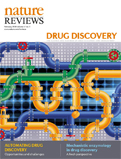|
Advertisement | |||||||||||||||||||||||||||||||||||||
| |||||||||||||||||||||||||||||||||||||
| TABLE OF CONTENTS | |||||||||||||||||||||||||||||||||||||
| February 2018 Volume 17 Number 2 | Advertisement | ||||||||||||||||||||||||||||||||||||
| In this issue
|
| |||||||||||||||||||||||||||||||||||
| |||||||||||||||||||||||||||||||||||||
 | |||||||||||||||||||||||||||||||||||||
| Advertisement | |||||||||||||||||||||||||||||||||||||
| |||||||||||||||||||||||||||||||||||||
| Advertisement | |||||||||||||||||||||||||||||||||||||
| |||||||||||||||||||||||||||||||||||||
| Advertisement | |||||||||||||||||||||||||||||||||||||
| |||||||||||||||||||||||||||||||||||||
| Advertisement | |||||||||||||||||||||||||||||||||||||
| |||||||||||||||||||||||||||||||||||||
| Comment: Regulatory policy for the development of targeted therapies for low-frequency molecular subtypes of disease Robert N. Schuck, Michael Pacanowski, Janet Woodcock & Issam Zineh p79 | doi:10.1038/nrd.2017.231 Numerous challenges arise when developing targeted therapies for diseases comprising low-frequency molecular subtypes. In this article, we describe a pragmatic, science-based regulatory policy for the development and approval of targeted therapies in such cases. Full Text | PDF | |||||||||||||||||||||||||||||||||||||
| NEWS AND ANALYSIS | Top | ||||||||||||||||||||||||||||||||||||
| 2017 FDA drug approvals Asher Mullard p81 | doi:10.1038/nrd.2018.4 The FDA approved 46 new drugs last year, the highest total in more than two decades. | |||||||||||||||||||||||||||||||||||||
| NEWS IN BRIEF Top product sales forecasts for 2018 Asher Mullard p86 | doi:10.1038/nrd.2018.15 | |||||||||||||||||||||||||||||||||||||
| Pfizer exits neuroscience Asher Mullard p86 | doi:10.1038/nrd.2018.16 | |||||||||||||||||||||||||||||||||||||
| EMA recommended 35 new drugs in 2017 Asher Mullard p86 | doi:10.1038/nrd.2018.17 | |||||||||||||||||||||||||||||||||||||
| BIOBUSINESS BRIEFS Market watch: 2017 FDA drug approvals: number rebounds but average value slips Mathias Baedeker, Michael Ringel, Valery Panier & Ulrik Schulze p87 | doi:10.1038/nrd.2018.2 | |||||||||||||||||||||||||||||||||||||
| AN AUDIENCE WITH Morgan Sheng p88 | doi:10.1038/nrd.2017.271 | |||||||||||||||||||||||||||||||||||||
| FROM THE ANALYST'S COUCH Biopharma deal-making in 2017 Amanda Micklus & Steven Muntner p91 | doi:10.1038/nrd.2018.1 This article analyses merger and acquisition (M&A) activity and partnerships in the biopharma industry in 2017, highlighting trends and major deals. | |||||||||||||||||||||||||||||||||||||
| Advertisement | |||||||||||||||||||||||||||||||||||||
| |||||||||||||||||||||||||||||||||||||
| PERSPECTIVES | Top | ||||||||||||||||||||||||||||||||||||
| INNOVATION Automating drug discovery Gisbert Schneider p97 | doi:10.1038/nrd.2017.232 Advances in areas such as microfluidics-assisted chemical synthesis and biological testing, as well as in artificial intelligence systems, are increasingly providing opportunities to introduce greater automation into the small-molecule drug discovery process. Schneider highlights approaches and technologies that seem poised to be implemented robustly by medicinal chemists in the near future and analyses the challenges for their more widespread application Abstract | Full Text | PDF | |||||||||||||||||||||||||||||||||||||
| REVIEWS | Top | ||||||||||||||||||||||||||||||||||||
| Mechanistic enzymology in drug discovery: a fresh perspective Geoffrey A. Holdgate, Thomas D. Meek & Rachel L. Grimley p115 | doi:10.1038/nrd.2017.219 Understanding the role of enzymes in disease states and the implementation of strategies to modulate their activities for therapeutic benefit remains a key focus for drug discovery. Here, Holdgate and colleagues assess the benefits of conducting and applying high-quality mechanistic enzymology studies throughout a drug-discovery programme and assess the value of combining such knowledge with orthogonal biophysical methods. Abstract | Full Text | PDF | |||||||||||||||||||||||||||||||||||||
| Emptying the stores: lysosomal diseases and therapeutic strategies Frances M. Platt p133 | doi:10.1038/nrd.2017.214 Lysosomal storage disorders (LSDs) are rare, inherited metabolic disorders that result from defects in lysosomal function, for which treatment options are limited. Here, Platt provides an overview of LSDs, approved and potential therapeutic approaches and agents currently in development. The challenges associated with LSD diagnosis, drug development and treatment are discussed. Abstract | Full Text | PDF | |||||||||||||||||||||||||||||||||||||
| CORRESPONDENCE | Top | ||||||||||||||||||||||||||||||||||||
| A dynamic map for learning, communicating, navigating and improving therapeutic development John Wagner, Andrew M. Dahlem, Lynn D. Hudson, Sharon F. Terry, Russ B. Altman, C. Taylor Gilliland, Christopher DeFeo & Christopher P. Austin p150 | doi:10.1038/nrd.2017.217 Full Text | PDF | Supplementary information | |||||||||||||||||||||||||||||||||||||
| Corrigendum: 2017 FDA drug approvals Asher Mullard p150 | doi:10.1038/nrd.2018.18 Full Text | PDF | |||||||||||||||||||||||||||||||||||||
| Advertisement | |||||||||||||||||||||||||||||||||||||
| |||||||||||||||||||||||||||||||||||||
| |||||||||||||||||||||||||||||||||||||
| You have been sent this Table of Contents Alert because you have opted in to receive it. You can change or discontinue your e-mail alerts at any time, by modifying your preferences on your nature.com account at: www.nature.com/myaccount For further technical assistance, please contact our registration department For print subscription enquiries, please contact our subscription department For other enquiries, please contact our feedback department Springer Nature | One New York Plaza, Suite 4500 | New York | NY 10004-1562 | USA Springer Nature's worldwide offices: Macmillan Publishers Limited is a company incorporated in England and Wales under company number 785998 and whose registered office is located at The Campus, 4 Crinan Street, London, N1 9XW. © 2018 Macmillan Publishers Limited, part of Springer Nature. All Rights Reserved. |
 |










1 comment:
A little care for your caregivers
There is no denying the fact that patients diagnosed with Cancer go through a lot of physical and emotional stress. However, they are not the only ones going through this ordeal. The family members and close friends who care for such patients undergo a lot of physical and emotional strain too. It is not easy to see a loved one go through so much pain and suffering and still stay positive and smiling. It is impossible to imagine the suffering that caregivers go through since they are physically and physiologically healthy but their souls are crying. However, as a caregiver, if there is one thing that you can do to help your loved one battling against Cancer, it is to take care of yourself along the journey. Imagine what would happen if the primary caregiver of a Cancer patient falls sick due to over-exhaustion or stress? It would just escalate the situation to a completely new level. Give yourself some Tender-Loving-Care (TLC).
FOR MORE INFORMATION VISIT
https://zenonco.io/articles-and-blogs/a-little-care-for-your-caregivers/
https://lovehealscancer.org/cancer-care/we-care-for-the-caregivers/
Post a Comment